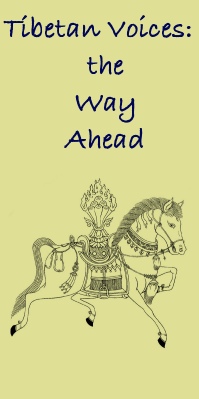Different views of the way ahead for Tibet
by Woeser
There may never in history have been another gathering that so stirred the hearts of Tibetans at home and abroad. This is primarily because Tibetans have never before been separated for so long. To the more than one hundred thousand Tibetans in exile, the Tibet on this side of the Himalayas is their homeland. To the almost six million Tibetans within the borders, on the far side of the Himalayas lies another Tibet which, though very small, contains Tibet’s soul. In the middle of this month, on that side of the mountains in Dharamsala (the seat of the Tibetan exile government) there will convene a representative assembly of Tibetans from all over the world to discuss Tibet’s future direction — obviously, an epochal event. At the beginning of March, H.H. the Dalai Lama declared that the problems of Tibet were for the Tibetan people to solve, and the future of Tibet was for the Tibetan people to decide.
We who are Tibetans within the borders, even though under the repression of a great power and so unable to express ourselves freely like Tibetans outside, still want to express our aspirations without being held back by fear. If I may offer a composite of the opinions of several contemporary intellectuals who live within the PRC, they think that the decision of His Holiness was exactly right (even though it seems to have been forced on him by events), because it will lead to better preparations for the future. Whatever path is chosen in the future will not be immutable. It won't be a rigid either/or; there will be elements of this and elements of that, or either one, or neither: different paths will cross or overlap, so that opportunities will recur. But at present, just as His Holiness said, the conciliatory accommodations of the past have been proven to be a failure. Consequently, whether Tibetans like it or not, there can be no continuing on the previous path.
There are more than ten monks in their twenties and thirties at a certain monastery in Amdo who were all arrested and beaten at the outbreak of protests against violence in March. Some of the monks bear on their wrists to this day the scars of the iron wire with which the Armed Police bound them. They say: though Tibetans are enduring adversity and suffering the lack of freedom, nevertheless, as disciples of Buddhism, they still want to follow the Middle Way advocated by His Holiness and strive non-violently for Tibetans’ rights. No matter how hard the future, it will still be their duty to walk the Middle Way of peaceful reason.
There is also a more intense point of view which holds that in the beginning His Holiness followed the path of Rangzen but later gradually changed, especially after Deng Xiaoping promised, “Except for independence, everything can be discussed.” What he sought then was a high degree of autonomy within the framework of China's constitution. However, after almost thirty years, there has been no progress at all. Therefore, at this juncture of history, the right course is to turn back to the path of Rangzen. Although the world’s support is still necessary, the important thing is for Tibetans themselves to shoulder this duty. Any people that has sought independence has had to pay for it with blood and lives. Though we don’t want to shed our blood, it can’t be helped, there’s no way around it; and so Tibetans both inside and out must join together and be prepared to sacrifice for this goal.
Some Western scholars who study China say Tibet has a wretched future no matter how you look at it. But young Tibetans retort that this view overlooks the numerous crises that lie hidden behind Communist China’s facade of power and greatness, and it also overlooks the vitality and creativity of Tibetans and Tibetan culture. The problem of Tibet is not the problem of His Holiness alone and it shall not be the case that with the passing of His Holiness, Tibetans and their culture will be bereft of vitality and creativity. His Holiness will return, borne on hope, and Tibetans will continue their struggle, upheld by a Tibetan culture that distills the essence of the Buddhist spirit. Although it will be a path filled with hardship, for Tibetans to seek their freedom does not mean a wretched future; or even if life does grow more bleak, we Tibetans will find courage that is a match for our oppression.
The most passive school of thought holds that no matter what path is chosen, whether Middle Way or Rangzen, while they both seem to put a choice before us, they are both empty choices, because neither will go far since we are under China’s thumb. We just have to let events take their course.
Woeser wrote this article for the Tibetan−language service of Radio Free Asia.
Translator’s notes
Rangzen The Tibetan word for ‘independence’
His Holiness will return, borne on hope I believe this is a reference to reincarnation though I am not sure of the phrase cheng yuan zai lai. Advice welcome!

